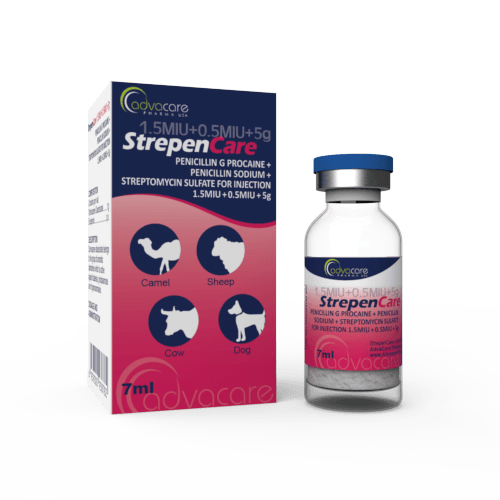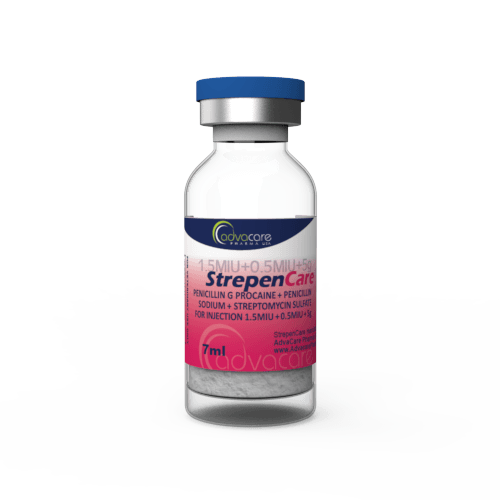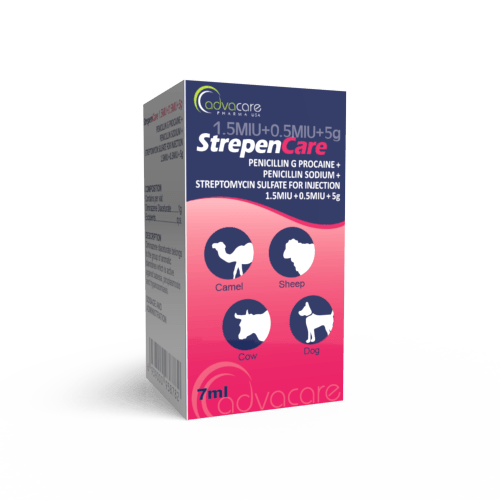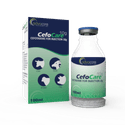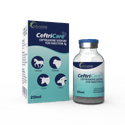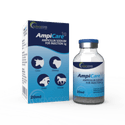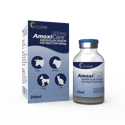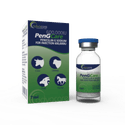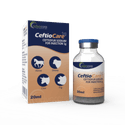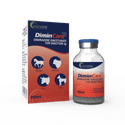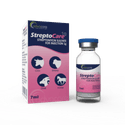- Home›
- Veterinary Pharmaceuticals›
- Veterinary Injections›
- Veterinary Powders for Injection›
- Penicillin G Procaine + Penicillin Sodium + Streptomycin Sulfate for Injection
Penicillin G Procaine + Penicillin Sodium + Streptomycin Sulfate for Injection
Dosage
Packaging
What is Penicillin G Procaine + Penicillin Sodium + Streptomycin Sulfate?
Active Ingredients: Penicillin G Procaine + Penicillin Sodium + Streptomycin Sulfate
Penicillin G Procaine + Penicillin Sodium + Streptomycin Sulfate for Injection is a broad-spectrum, high-efficiency, and long-acting antibiotic for intramuscular use. This combination of local anesthetic and antibiotic is used to treat infections caused by sensitive gram-positive and gram-negative organisms in animals such as camels, cats, cows, dogs, goats, horses, sheep, and pigs.
Penicillin G Procaine belongs to the family of medicines called penicillin antibiotics. It works by inhibiting cell wall formation. This medication is used for microorganisms that are susceptible to low serum levels of the drug. Procaine penicillin is also known by the names Procaine Benzylpenicillin and Penicillin G Procaine. Procaine has been added to help reduce pain, as penicillin G may cause localized pain reactions after 4 or 5 days.
This antibiotic remains stable in acidic environments and is readily absorbed when administered via injection. Absorption may be prolonged due to its extended presence in the bloodstream and tissues. The antibiotic distributes widely throughout the body's fluids and tissues but typically does not cross certain barriers unless administered at high doses. During pregnancies, the distribution volume of the drug may increase. Penicillin is excreted unchanged with minimal metabolic alteration. Approximately 90% of the drug is eliminated through urine within six hours, primarily via glomerular filtration and active tubular secretion. There is also potential excretion through bile, with trace amounts found in milk.
Streptomycin sulfate belongs to the family of medicines called aminoglycoside antibiotics. It works by stopping the production of essential proteins needed by the bacteria to survive. This antibiotic has bactericidal effects against pathogens by targeting rapidly multiplying organisms through multiple mechanisms. It achieves its bactericidal effect with brief contact time with bacteria. Its primary mode of action is interference with protein synthesis at the bacterial ribosome-associated with the membrane. The antibiotic disrupts lipopolysaccharides via active cell transport. Absorption from the gastrointestinal tract is minimal, typically less than 10%, with increased permeability observed in neonates and individuals with enteritis.
Intramuscular administration provides optimal absorption, with peak blood concentrations achieved within 30-90 minutes. The antibiotic's distribution is primarily limited to extracellular fluids, except in the kidneys and inner ear, with increased distribution in cases of dehydration and sepsis. The antibiotic does not penetrate into cerebrospinal fluid, milk, ocular fluids, intestinal fluids, or prostatic secretions. It is excreted unchanged via urine through glomerular filtration within 24 hours of administration. Elimination depends on cardiovascular function, age, presence of fever, renal function, and other individual factors.
Penicillin G Procaine + Penicillin Sodium + Streptomycin Sulfate for Injection should be prescribed by a veterinary doctor or animal care specialist. This product is not for human use.
AdvaCare Pharma is a producer and exporter of Penicillin G Procaine + Penicillin Sodium + Streptomycin Sulfate for Injection. This veterinary medicine is manufactured under strict GMP guidelines in facilities in China, India, and the USA.
Why are we a trusted Penicillin Procaine + Streptomycin manufacturer?
AdvaCare Pharma is a leading GMP manufacturer of Penicillin G Procaine + Penicillin Sodium + Streptomycin Sulfate Injection for veterinary use. Our company was established with the aim of providing excellent value to our veterinary distributors by concentrating on competitively priced, high-quality veterinary pharmaceuticals with market-tailored solutions.
Over the past 20 years, AdvaCare Pharma has proven to be a trusted Penicillin G Procaine + Penicillin Sodium + Streptomycin Sulfate manufacturer and supplier of 100+ veterinary injections in over 65 countries.
Uses
What is Penicillin Procaine + Streptomycin used for?
It is used to treat bacterial infections such as:
- bacterial pneumonia (shipping fever complex) in cattle
- upper respiratory infections (rhinitis, pharyngitis) in cattle
- blackleg (due to Clostridium chauvoei) in cattle
What animals can be treated with Penicillin Procaine + Streptomycin?
This medicine is recommended for livestock animals such as camels, cows, pigs, goats, and sheep. It is also used to treat horses and companion animals like cats and dogs.
How is Penicillin Procaine + Streptomycin used?
This drug has been manufactured as a powder for reconstitution. The solution, which is relatively unstable, should be administered to the patient within 1 hour of reconstitution. This medicine can be administered either by intravenous or intramuscular route. The antibiotic should be reconstituted with sterile water, and administered promptly. Before application, ensure the area is thoroughly cleaned and maintain aseptic conditions. If the animal's coat is dirty, clean it prior to administration. Use a good antiseptic such as benzalkonium chloride in 70% alcohol, and avoid applying it to dirty or infected skin.
Why is Streptomycin Sulfate used in animals?
This antibiotic is used to manage both localized and systemic infections caused by susceptible gram-negative bacteria. It is effective in treating mastitis and may occasionally be administered directly into the udder. This procedure should only be performed under veterinary guidance and based on current health conditions. When used in lower doses, it can also target gram-positive bacteria such as Staphylococci, although more frequent dosing intervals are typically required. This antibiotic is suitable for treating infections caused by Actinomyces bovis, Pasteurella spp., E. coli, Salmonella spp., Campylobacter fetus, Leptospira spp., Brucella spp., and Mycobacterium tuberculosis.
How can Streptomycin Sulfate help in respiratory diseases? When the respiratory disease is caused by a bacteria susceptible to this antibiotic, administering Streptomycin can lead to a rapid recovery. This treatment will alleviate clinical symptoms such as fever, nasal discharge, and respiratory distress. It will also result in improvements in blood tests and urinalysis. Streptomycin is widely used for treating tuberculosis in animals and is considered the most potent antibacterial agent against this condition.
Why is Penicillin used in animals?
This antibiotic is used for treating gram-positive bacteria, although it can also be effective against gram-negative organisms. Gram-negative bacilli and cocci can be susceptible to high parenteral doses of Penicillin G. Specifically, this antibiotic is effective in treating bacterial pneumonia caused by Pasteurella multocida in cattle and sheep. It is also used to treat Erysipelothrix rhusiopathiae infections in swine and Streptococcus equi infections in horses.
This antibiotic shows no effects or minimal effects in treating many anaerobic gram-negative bacilli. Before adding and prescribing this antibiotic to animals, a detailed antibiogram should be performed.
Is this antibiotic enough for treating a disease?
The adequacy of treatment with this antibiotic depends on the diagnosis, and in some cases, it may be enough alone. The veterinarian should make a decision based on the antibiogram and the specific diagnosis. Additional supplements are included in the treatment regimen for various diseases.
How should Penicillin Procaine + Streptomycin be stored?
This medication should be stored in a dark, dry location under 30°C. Keep the bottle tightly sealed when not in use.
What are the withdrawal times for Penicillin Procaine + Streptomycin?
For beef cattle, the withdrawal time for meat is 30 days if given subcutaneously. Do not slaughter a calf for veal if it has been given this Penicillin G Procaine + Penicillin Sodium + Streptomycin Sulfate for Injection.
Dosage
How much Penicillin Procaine + Streptomycin should be given to cattle or horses?
After reconstitution, the usual dose is between 10-30ml.
How much Penicillin Procaine + Streptomycin should be given to goats?
After reconstitution, the usual dose is between 0.2-10ml per kg of body weight.
Refer to a veterinary doctor or pharmacist for guidelines on dosage.
Side Effects
As with all pharmaceuticals, some unwanted effects can occur from the use of Penicillin G Procaine + Penicillin Sodium + Streptomycin Sulfate for Injection.
Common side effects include but are not limited to:
- gastrointestinal effects (diarrhea, loss of appetite)
- pain at the injection site
Serious side effects may include:
- allergic reaction and anaphylaxis
- severe loss of appetite in cats
For a comprehensive list of all possible side effects of this medication, consult a veterinarian.
Precautions
Do NOT use Penicillin G Procaine + Penicillin Sodium + Streptomycin Sulfate for Injection for an animal that: • has a known allergy or hypersensitivity to penicillin.
Treatment with this drug should be administered with caution in an animal that:
- is hypersensitive to other beta-lactam antibiotics such as cephalosporins.
- has an electrolyte disorder.
- is of the following species: snakes, rabbits, guinea pigs, gerbils, hamsters, or chinchillas.
- is pregnant or lactating.
This medication should not be administered into the vein.
What are the most common animals for which Penicillin Procaine + Streptomycin is used?
Penicillin Procaine + Streptomycin is primarily used for treating bacterial infections in companion animals and livestock. The specific common uses include treatment of the following:
- pneumonia
- foot rot
- soft-tissue infections
- open-wound infections
- mastitis
- otitis externa
- endometritis
- endocarditis
- wound and postnatal sepsis
- erysipelas and edema in pigs
- brucellosis
- tularemia
- pneumonia
- campylobacteriosis
- leptospirosis
- actinomycosis in cows
Companion Animals Bacterial Infections
This drug is an effective antibiotic against many respiratory diseases and diseases caused by most gram-positive bacteria in companion animals. It is particularly used for treating otitis externa caused by bacterial pathogens in companion animals.
Horse Bacterial Infections
In horses, this drug is especially recommended for respiratory infections and open-wound infections.
Swine Bacterial Infections
This antibiotic is mostly used for treating mastitis and metritis. It can also be used for treating gastrointestinal diseases or serious respiratory infections based on the antibiogram.
Ruminants (Cow, Goat, and Sheep) Bacterial Infections
This product is used for treating severe infections in cows, including respiratory infections and mastitis. It can also help in treating foot infections (such as foot rot), as well as certain skin infections.

You might be interested in...
Why AdvaCare Pharma?
As an industry leader, we are aware of our responsibility to provide affordable and sustainable solutions to improve healthcare worldwide.
